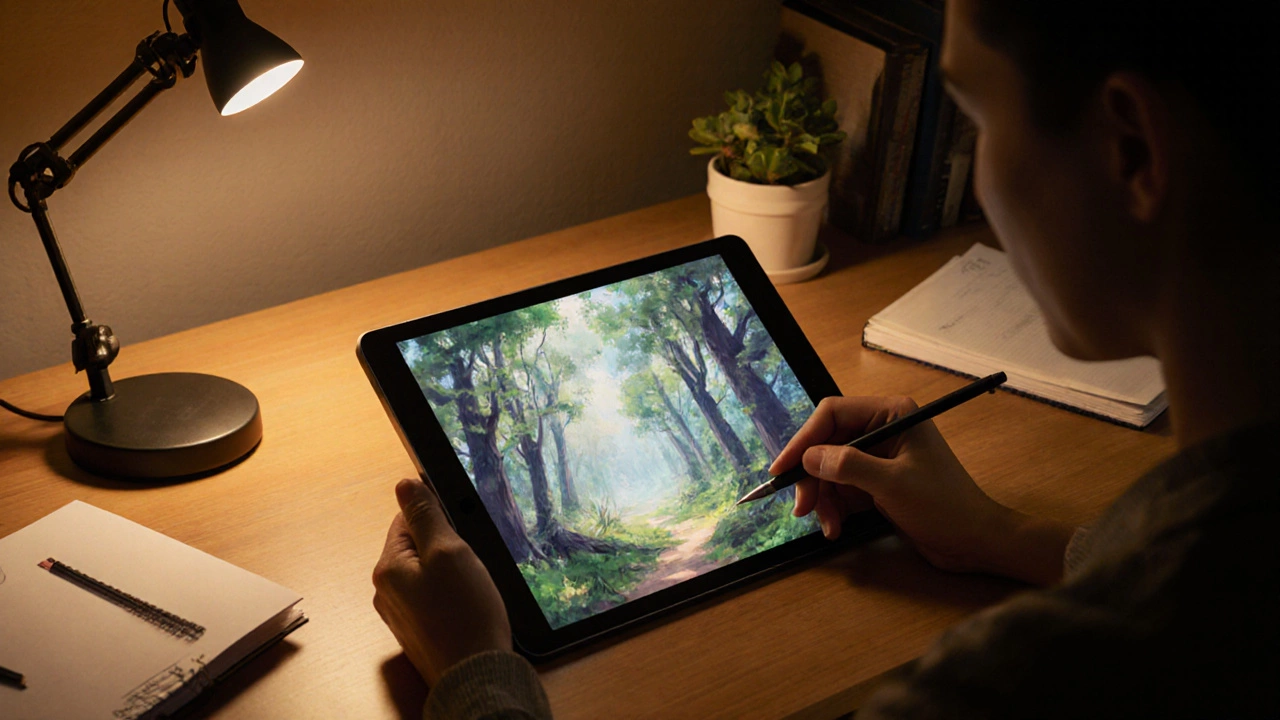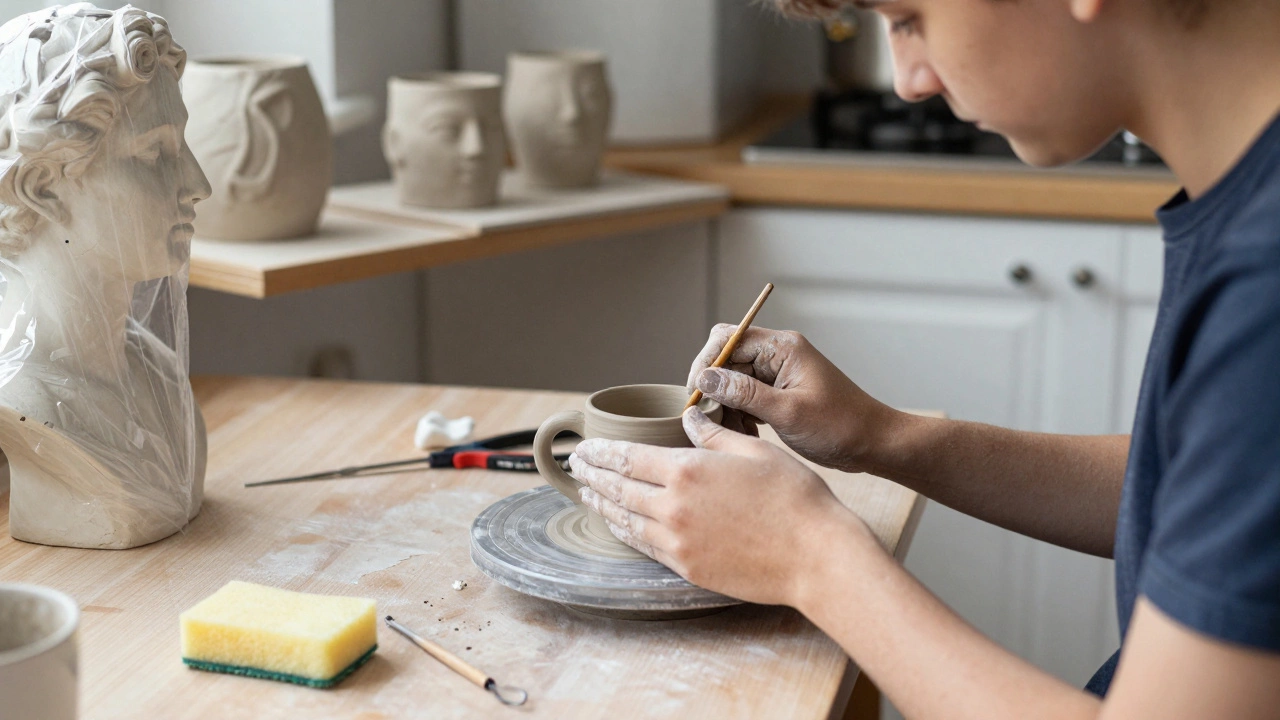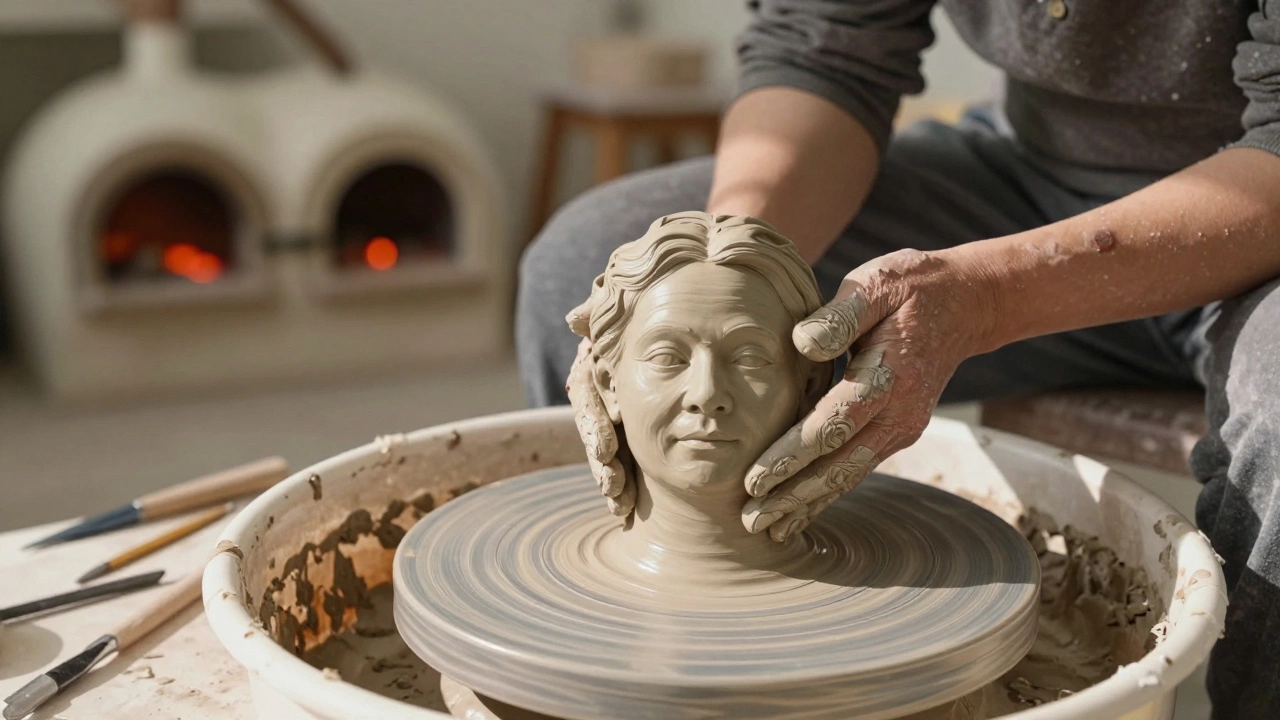If you’re creating digital art and thinking about selling it on Etsy, the first question that pops up isn’t about pricing or thumbnails-it’s about legality. Do you need a license to sell digital art on Etsy? The short answer: no, not a general business license from the government. But that doesn’t mean you’re free to upload anything and call it yours. The real rules are about ownership, copyright, and what you’re actually selling.
What Etsy Actually Requires
Etsy doesn’t ask you to show a business license when you sign up. You don’t need to file paperwork with your city or state just to open a shop. That’s different from selling physical goods in a store or at a craft fair, where local regulations often apply. Etsy’s rules focus on one thing: you must own the rights to what you’re selling.If you made the digital file yourself-whether it’s a watercolor scan turned into a print, an illustration you drew in Procreate, or a generative AI artwork you tweaked-then you’re the copyright holder. That’s all Etsy needs to see. They don’t check your ID or tax forms. But they do scan listings for copyright violations, and if someone reports you, your shop can be shut down fast.
Copyright Is Your Real License
You don’t need to register your artwork with the U.S. Copyright Office to sell it on Etsy. But you do need to own the copyright. Under U.S. law (and most international copyright systems), copyright is automatic the moment you create an original work in a fixed form. That means your digital painting, vector logo, or NFT-style design is protected as soon as you save it.Here’s the catch: if you didn’t create it, you can’t sell it. That includes:
- Downloading free PNGs from Pinterest and reselling them as "premium digital art"
- Using stock photos from Shutterstock without an extended license
- Copying a character from a movie or video game and turning it into a printable poster
- Using AI-generated images from tools like Midjourney or DALL·E if you didn’t follow their commercial use terms
Some artists think, "I edited it a little, so it’s mine now." That’s not how copyright works. Even if you change colors or crop a photo, if the original work is recognizable, you’re infringing. Etsy has a system where rights holders can submit takedown notices-and they do, often. One complaint can delete your listing. Two can suspend your shop.
AI Art and Etsy: The Gray Zone
AI-generated art is the biggest gray area right now. Etsy doesn’t ban AI art outright. But they do require you to disclose if you used AI tools. More importantly, you must have the right to use the output commercially.Let’s say you used Midjourney to create a fantasy landscape. Midjourney’s terms say you own the images you generate with a paid plan-and you can sell them. That’s fine. But if you used a free version, you can’t sell them. If you used an AI tool that doesn’t grant commercial rights, you’re breaking the rules.
Some sellers try to disguise AI art by calling it "hand-painted" or "inspired by AI." That’s risky. Etsy’s policy says you must be truthful. If you used AI, say so. If you didn’t, don’t lie. Buyers are getting smarter. They’re checking metadata. They’re comparing styles. And they’re reporting suspicious listings.
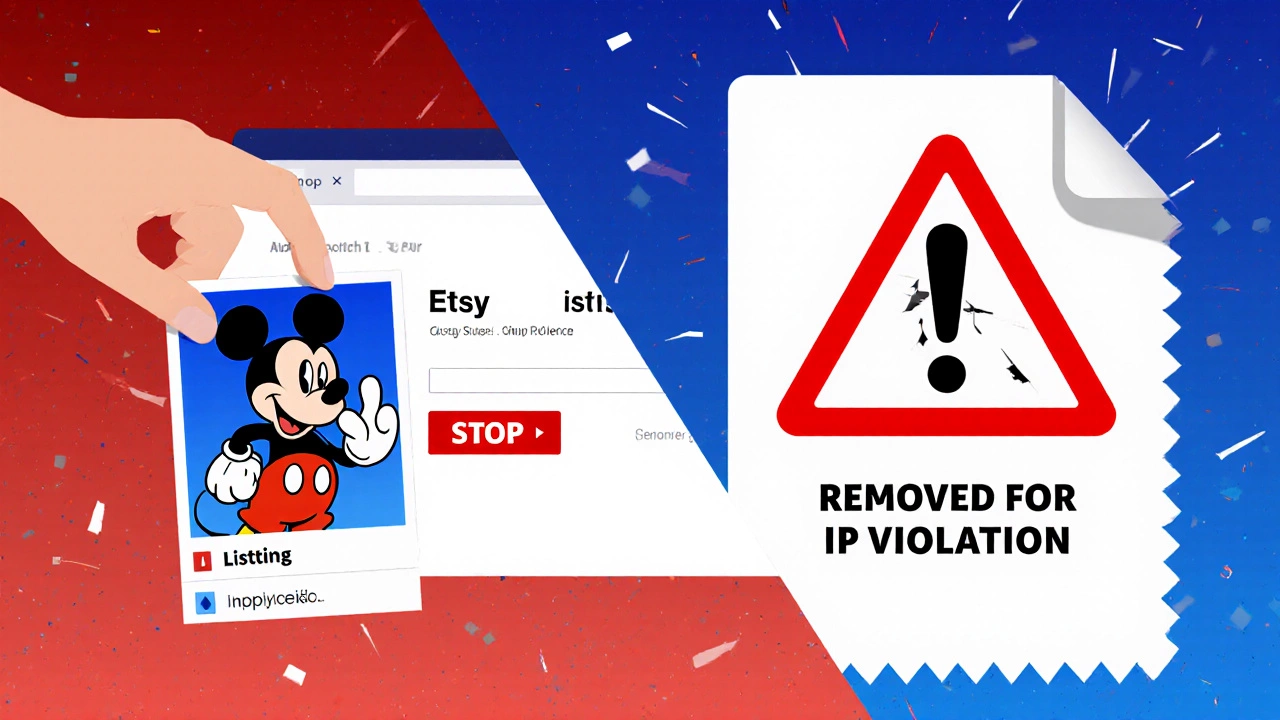
What About Trademarks and Branding?
Copyright isn’t the only legal trap. Trademarks matter too. You can’t sell digital art featuring Mickey Mouse, Nike swooshes, or Disney princesses-even if you drew them yourself. Those are protected brands. Even if you’re not claiming it’s official Disney merchandise, you’re still using their intellectual property.Same goes for logos, band names, sports teams, or fictional characters from books and shows. A custom portrait of Harry Potter with a wand? That’s infringement. A print of the Eiffel Tower? That’s fine-it’s in the public domain. But a digital art piece of the Starbucks mermaid? That’s not.
There’s no official database to check for every trademark, but if it’s something you’ve seen on a product, in a movie, or on a logo, assume it’s protected. When in doubt, leave it out.
What You Should Do Before Listing
Here’s a simple checklist to avoid trouble:- Did you create the artwork yourself? If yes, you’re good.
- If you used AI, did you use a paid plan with commercial rights? If yes, disclose it in your listing.
- If you used stock assets (photos, brushes, textures), did you buy a commercial license? If not, remove them.
- Is there any recognizable brand, logo, or character? If yes, don’t sell it.
- Have you checked Etsy’s Intellectual Property Policy? If not, read it now.
Also, be clear in your listing. Don’t say "instant download" without saying what the buyer gets. Specify file formats (PDF, PNG, SVG), size, and whether it’s for personal or commercial use. If you allow buyers to print and resell your art, say so. If you don’t, say that too.
What Happens If You Get Reported?
Etsy doesn’t investigate every report. They rely on rights holders to file claims. If someone says you copied their artwork, Etsy will remove your listing and send you a warning. One warning is usually a slap on the wrist. Two, and your shop gets suspended. Three, and you’re banned.Some sellers try to appeal by saying, "I didn’t know," or "I changed it." But ignorance isn’t a defense. Etsy’s system is automated and fast. The best way to avoid this? Don’t risk it.
There are real artists who’ve lost their shops after years of selling because they used a free brush pack or downloaded a background from DeviantArt. It’s not worth it.
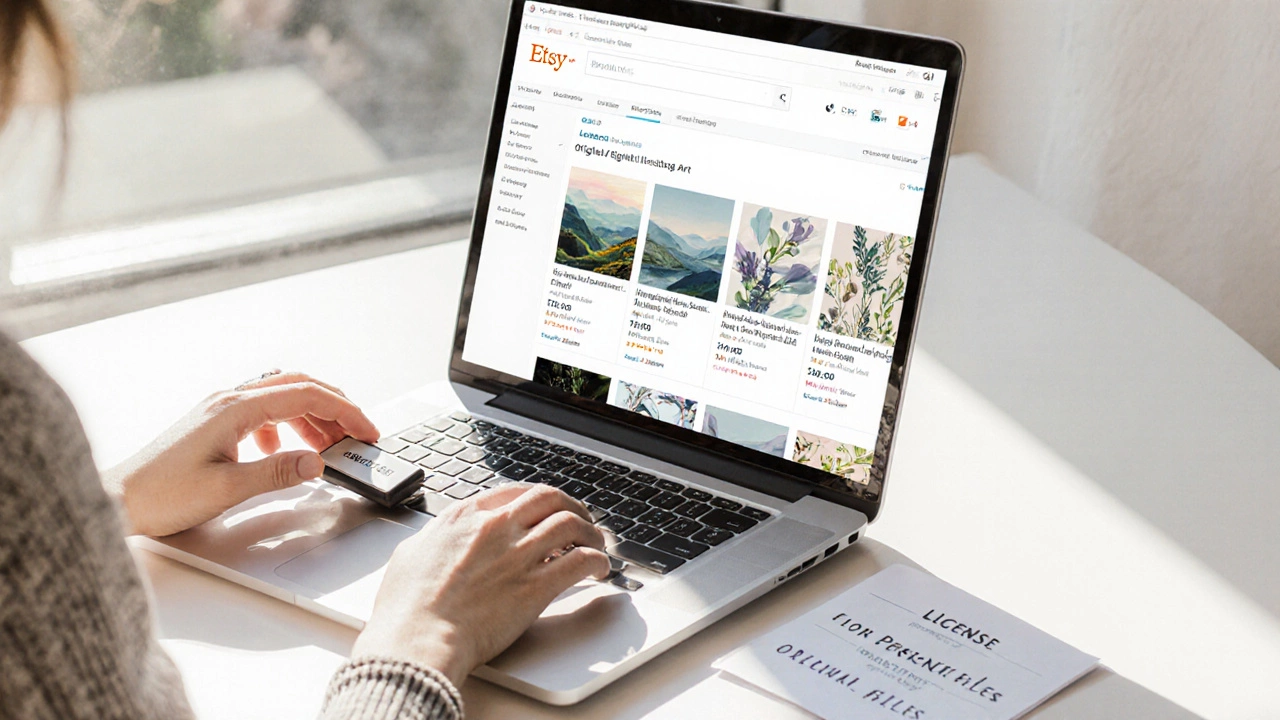
Protect Your Own Work
Once you’re selling legally, protect your own art. Add a small watermark to your preview images. Don’t upload full-resolution files unless you have to. Include a license in your download-something simple like: "This digital file is for personal use only. Resale, redistribution, or commercial use without permission is prohibited."You can also register your copyright with the U.S. Copyright Office (cost: $45-$65). It’s not required, but if someone steals your art and sells it on Amazon or Redbubble, you can sue for damages. Without registration, your legal options are limited.
Bottom Line: It’s Not About a License-It’s About Ownership
You don’t need a license to sell digital art on Etsy. But you do need to own what you’re selling. Your creativity is your license. Your originality is your protection. Your honesty is your shield.Don’t copy. Don’t cheat. Don’t assume it’s okay because "everyone else is doing it." The art world is watching. Buyers are learning. Etsy is getting smarter. The only sustainable way to sell digital art is to make it yourself-and make it yours.
Do I need a business license to sell digital art on Etsy?
No, Etsy does not require a business license to open a shop or sell digital art. However, depending on where you live, your local government might require a business license or tax permit if you’re earning income. Check with your city or state tax office to be sure.
Can I sell AI-generated art on Etsy?
Yes, but only if you used an AI tool that gives you commercial rights and you follow their terms. For example, Midjourney allows commercial use with paid plans. You must also disclose that AI was used in your listing. Selling AI art made with free tools or without permission violates Etsy’s policies.
What if I use someone else’s photo in my digital art?
You can’t use someone else’s photo unless you have explicit written permission or a commercial license. Even if you edit it, recolor it, or turn it into a sketch, the original image is still protected by copyright. Using unlicensed photos is one of the most common reasons Etsy shops get shut down.
Can I sell prints of my digital art that include famous landmarks?
Yes, you can sell digital prints of famous landmarks like the Eiffel Tower, Statue of Liberty, or Taj Mahal, because these structures are in the public domain. But you can’t include trademarks, logos, or branded elements that appear in the scene-like a Starbucks cup in the foreground or a Disney character nearby.
How do I know if my digital art is original enough to sell?
Ask yourself: Would another artist recognize this as a copy of someone else’s work? If the answer is yes, it’s too close. Original art means you created the composition, colors, style, and elements yourself-even if you were inspired by others. Inspiration is fine. Replication is not.
Next Steps for New Sellers
Start small. Create five original pieces-no AI, no stock assets, no borrowed elements. List them on Etsy. See how they sell. Get feedback. Build your portfolio. Once you’re confident in your style, expand slowly. Learn the rules before you break them.Selling digital art on Etsy isn’t about shortcuts. It’s about building something real. And real art doesn’t need a license-it just needs to be yours.
